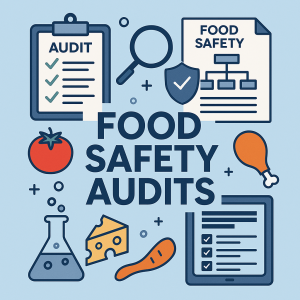What Is Food Safety and Why Does It Matter?
Food safety — more accurately referred to as food reliability in scientific terms — is a crucial concept that addresses the prevention of all potential hazards that may arise during consumption. Whether biological, chemical, physical, or allergenic, these hazards pose direct risks to consumer health and the food industry as a whole.
Biological and Microbiological Hazards
Food poisoning is the most widely known food safety concern. It occurs when harmful microorganisms multiply in food and compromise the consumer’s immune system. These risks are a focal point of every food safety audit conducted in food production environments.
Physical Hazards
Foreign substances such as plastic pieces, glass shards, or even screws can accidentally contaminate food. These are evaluated during any thorough food safety audits, as consumer injury from such incidents can be severe.
Chemical Hazards
Chemicals like pesticides, additives, or cleaning agents can contaminate food, either through processing or environmental exposure. Monitoring for such risks is a critical part of any food safety audit software procedure.
Allergenic Hazards
Allergens — proteins found in certain foods — may trigger fatal reactions in sensitive individuals. These hazards are difficult to control and are a high-priority focus in every food safety audit.
FevQuality offers comprehensive allergen management training for professionals interested in gaining further expertise.
Food Safety Management Systems (FSMS)
To mitigate all types of food-related hazards, companies adopt Food Safety Management Systems (FSMS). ISO 22000:2018 is currently the most recognised international standard. It outlines a structured approach that aligns with the expectations of food safety audits worldwide.
GFSI-approved schemes like BRCGS Food, FSSC 22000, and IFS Food are broader in scope and widely accepted across international markets. As part of every food safety audit software, these systems are rigorously evaluated to confirm compliance with safety regulations.
The Rise of Digital Food Safety Audits
Remote inspection methods became widely accepted during the pandemic, introducing the concept of the digital food safety audit. While on-site inspections remain essential for production line reviews, document checks and internal records are increasingly managed remotely.
Technologies like AI and ERP systems help automate parts of the food safety audit software, significantly improving efficiency. At FevQuality, we encourage young professionals to engage in AI-driven food technology to shape the future of digital inspections.
Choosing the Right Certification for Your Business
Depending on your objectives — whether exporting, participating in domestic tenders, or simply improving internal processes — the right certification may differ.
- For local market requirements, ISO 22000:2018 suffices.
- For international export, you may need a certification recognised across borders, such as FSSC 22000 or BRCGS Food.
These choices impact how food safety audits are conducted and what standards will be applied during inspections.
FevQuality provides expert consultancy to guide businesses through the selection and certification process, ensuring that you’re prepared for every upcoming food safety audit.
How to Prepare for a Food Safety Audit
Once you’ve chosen a certification scheme, the audit process begins. Trusted consultants and accredited certification bodies play a vital role in helping you prepare for a successful food safety audit software. It’s crucial to have a reliable management representative within your team — someone who knows the system inside and out.
During a food safety audit, auditors assess operational procedures, cleanliness, record-keeping, and response protocols. FevQuality supports clients at every step, offering industry insights and actionable guidance.
Maintaining Compliance and Continuous Improvement
Passing a food safety audit isn’t the end — it’s the beginning of a commitment to consistent quality. Scheduled audits, corrective actions, and improvement plans should be part of a living food safety strategy.
FevQuality offers long-term support services, ensuring our partners maintain their certifications and exceed expectations in every food safety audits that follow.
Final Thoughts
Whether you’re entering new markets or simply striving for operational excellence, food safety is the foundation. Integrating a well-structured FSMS and preparing for regular food safety audits will protect your consumers and your brand.
At FevQuality, we stand ready to guide you through the complexities of certification, audit preparation, and sustainable compliance — because your success in every food safety audit software is our shared mission.

